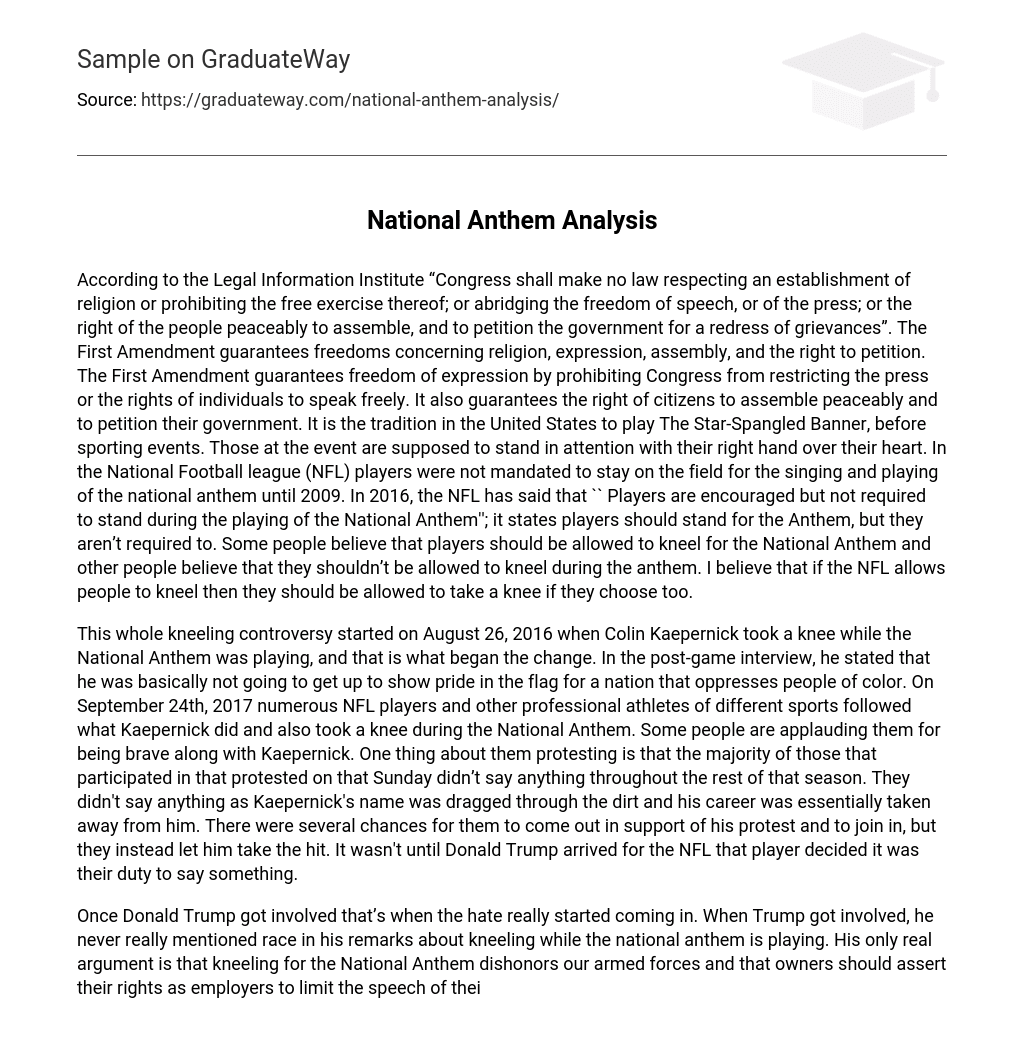According to the Legal Information Institute, the First Amendment of the United States Constitution prohibits Congress from passing laws that establish religion, restrict freedom of speech or press, impede peaceful assembly, or hinder the right to petition the government. This amendment guarantees freedoms related to religion, expression, assembly, and petitioning. Freedom of expression protects against press censorship and limitations on individual speech. Additionally, citizens have the right to peacefully assemble and petition their government.
Traditionally in the United States, The Star-Spangled Banner is played before sporting events with attendees expected to stand and place their right hand over their heart. However, it was only in 2009 that National Football League (NFL) players were mandated to stay on the field during the national anthem. In 2016, NFL issued a statement encouraging players to stand but did not enforce it as a requirement.
There are differing opinions regarding whether players should be permitted to kneel during the anthem. Personally speaking,I believe that if NFL allows kneeling,the players should be allowed this choice.
Colin Kaepernick started a controversy on August 26, 2016, when he knelt during the National Anthem to express pride for a country that oppresses people of color. He clarified his decision in a post-game interview. On September 24, 2017, many NFL players and athletes from different sports followed suit by also kneeling during the National Anthem. These individuals were praised, including Kaepernick himself, for their brave actions. It is worth noting that most participants remained silent for the rest of the season while Kaepernick faced damage to his reputation and essentially ended his career. They failed to show support or solidarity until Donald Trump came into the NFL scene and prompted them to finally speak up.
Donald Trump’s involvement sparked a surge of hate. He never explicitly mentioned race in his remarks regarding kneeling during the national anthem. His main argument was that kneeling disrespects our armed forces and that owners should use their rights as employers to limit their employees’ speech. Opponents of kneeling believe it goes against American values. They argue that the protests are unrelated to the anthem and should be conducted outside of work. They believe athletes should find alternative methods to protest police brutality rather than kneeling during the national anthem.
The argument against kneeling during the National Anthem often relies on emotions, claiming it is disrespectful and should be banned. However, disrespect alone does not warrant prohibition. This can be seen in the case of free speech – while hurtful or racist comments should not be made, individuals still have the right to express their opinions, even if offensive. Similarly, with regards to the flag, those who choose not to stand because they believe others are mistreated should not be compelled to do so. Opponents of kneeling are primarily driven by emotions and seek rules based on feelings rather than acknowledging our freedom of expression rights. It is important to consider countries like Canada where hate speech can result in imprisonment – we should appreciate living in a country where we can freely voice our differences.
The decision to not stand for the National Anthem can be justified when individuals believe that the United States is failing to uphold its ideals of independence, freedom, and justice for all. This issue goes beyond football and should not be ignored by our country. Instances of violence occur on our streets without proper consequences, allowing murderers to avoid being held accountable. Other athletes, like Brandon Marshall from the Denver Broncos, have also chosen not to stand for the anthem due to similar reasons. Marshall explicitly stated that his actions are against social injustice rather than being against the military or police. By expressing this, he rejects Donald Trump’s claims and shows that they are protesting against social injustices in society.
People advocating for their beliefs and urging the world to listen and bring about change is deeply ingrained in our history. Our past is marked by exceptional civil rights leaders who have peacefully protested against injustice, catalyzing significant advancements. Consider the influential figures such as Martin Luther King Jr. and Rosa Parks, who fearlessly championed their convictions. While not equating Colin Kaepernick’s impact to theirs, it is crucial to acknowledge that fighting for one’s beliefs is imperative in effecting change within our nation.





